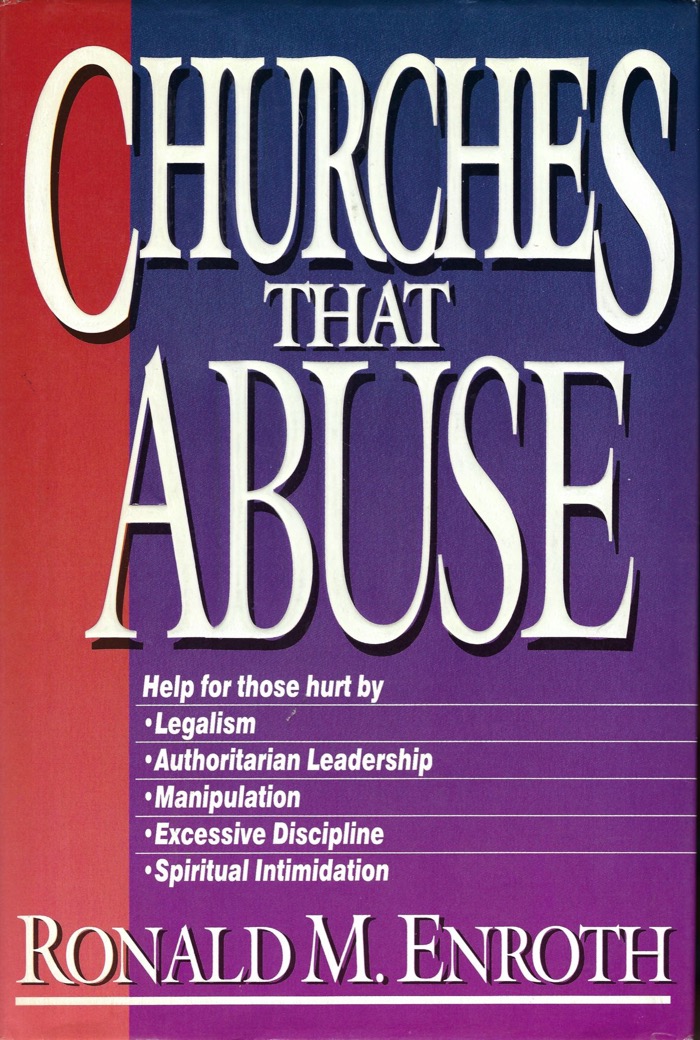Churches that Abuse
Reviewed date: 2024 Sep 6
231 pages
My thoughts
This 1992 book on abusive churches is big on examples. We get stories of many different abusive churches. This is helpful in one sense: it gives us a picture of what happens in high-control systems. We see how they operate, how they influence and manipulate and control their members. Reading so many different examples should, hopefully, allow us to recognize these abusive churches when we encounter them.
On the other hand, Enroth does not do a good job of explaining the systems at work. We get many examples, but it's often unclear what specific feature he is trying to highlight. So we get a broad view and lots of examples, but not enough framework to hang it all on.
Prior to reading this book, I'd read The Subtle Power of Spiritual Abuse by David Johnson and Jeff Van Vonderen, and that book gives a good conceptual framework for understanding abuse, high-control systems. I'd suggest reading that book first, then reading Churches that Abuse to supplement it.
1. Introduction
Abusive Churches: A View From Within
An example of an abusive church: Set Free Christian Fellowship in Anaheim, CA with Pastor Phil Aguilar. Abusive churches invariably have a high-control authoritarian at the top.
2. Fringe and Fanaticism
Abusive Churches Can Go Over the Edge
Donald Lee Barnett’s Community Chapel went off the rails with spiritual dancing, etc. They neglected the Bible and started focusing on experiences, getting into occult practices. Subjective experience became the test of truth, not the Bible. If so
“The tragedy of community Chapel goes back to a misplaced loyalty. People thinking that they were placing their allegiance in the ward of God were actually placing their allegiance in a man and his interpretation of the word of God. That is crucial to understanding why people were so easily deceived. they thought they were really obeying the word of God” p48
3. Past and Present
Abusive Churches Are Not New
Frank Sandford’s turn-of-the-century Shiloh cult in southern Maine. “Sandford was convicted because he withheld not only medical treatment, but faith healing as well” (p68)
4. Authority and Power
Abusive Churches Misuse Scriptural Authority
Church of Bible Understanding. “Control-oriented leadership is at the core of all such churches.” (p80)
5. Manipulation and Control
Abusive Churches Use Fear, Guilt, and Threats
Love-bombing, manipulation, fear, control, humiliation. Internal Surveillance and reporting systems help abusive churches keep their people under control. Cutting off family, friends, support systems. Prior approval and strict oversight of any dating relationships, or even outright bans on marriage, or arranged marriages.
6. Elitism and Persecution
Abusive Churches See Themselves as Special
Spiritual elitism. Make people feel they are special, have special knowledge, special revelation, special access to God’s work. They are insiders. And persecution is a mark of elitism. More suffering means more holiness, more spirituality. This allows leaders to brutalize people in order to purify them. It’s all a sham to control people.
7. Life-Style and Experience
Abusive Churches Foster Rigidity
Abusive groups descend into legalism, dictating the smallest decisions like dress, decor, etc. which must all be approved by the leadership. Enforced conformity of lifestyle.
8. Dissent and Discipline
Abusive Churches Discourage Questions
Groups use public humiliation and ridicule as discipline. Dissent is not tolerated. Strange discipline: children taken from their mothers, forced diets, forced fasting, beatings, forbidden to bathe. Members are discouraged or disallowed from reading or viewing outside criticism or outside material.
9. Exit and Adjustment
Abusive Churches Make Leaving Painful
Leaving is hard and emotional. There is a period of desocialization (leaving the group) and then resocialization into mainstream culture. The emotional needs during this time are high. It’s post-traumatic stress on par with rape victims or combat veterans. It can begin with numbness, a lack of feeling. This is a protective mechanism. Extreme fatigue and sleepiness. People develop antisocial and confrontational traits. They are still vulnerable and weak. “Vague and undefined anger is common at this point.” Complex feelings of loss, isolation, confusion. Difficulty trusting. “Depression is almost inevitable.”
An ex-member states: “It is an extremely important factor whether a person leaves an abusive-church situation knowing that the group was wrong, or believing that he was wrong and is now stunning against God.”
After the initial period, the post-group reality sets in. “Depression, frustration, and alienation.” The world is hard to manage. Guilt over wasted years. Self-condemnation. Avoidance for a time, because they aren’t ready to handle what they left. Shame, embarrassment. A job or career may be an anchor. Counseling can help.
Shame, embarrassment, doubts about God, inability or reluctance to trust people.
The group shuns those who leave, so people lose all their connections and friendships.
Leaving is hard, not allowed sometimes.
10. Discernment and Response
Abusive Churches Present a Warning
Abusive churches prey on the spiritually immature who do not recognize that what they are getting is counterfeit. They have zeal for God but no knowledge and little wisdom. The church asserts control through offering guidance and advice, and the new members quickly become unable to function without instructions from those in authority over them. The churches usually teach orthodox Christianity with maybe a few odd but not outlandish beliefs, though the behavior and practice doesn’t measure up.
“Authoritarian leaders are ecclesiastical loners. That is, they do not function well or willingly in the context of systematic checks and balances.”
11. Challenge and Change
Abusive Churches Will Always Exist
A warning that abusive churches are forming right now, that the tendency toward abuse is common, and that if it is noticed early it can sometimes be corrected. Enroth gives several examples of churches that seem to be making sincere repentance for their prior authoritarian ways. (Maranatha even shut itself down.)
